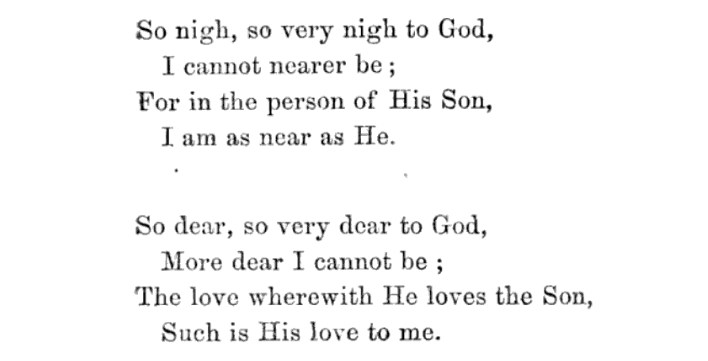A scene from The Canterbury Psalter (12th century)
Blog
“I Cannot Nearer Be”

There are a couple of hymn stanzas that used to show up in a lot of the kind of nineteenth-century evangelical devotional literature that I like to read: authors like R.A. Torrey, A. T. Pierson, Adolph Saphir, Ruth Paxson, and so on all quote exactly these two stanzas. I’ve seen it in Keswick-ish and Methodist sources, but also in more Reformed and Calvinistic texts (Spurgeon alludes to them somewhere). I quote them myself in The Deep Things of God (second edition, chapter 8) as exhibit A for how the experiential Trinitarianism of the evangelical tradition obeys an instinct to “reserve our most astonishing claims about intimacy with God” for contexts in which we can tether them to the Trinity:
So near, so very near to God,
I cannot nearer be;
For in the person of His Son,
I am as near as He.
So dear, so very dear to God,
More dear I cannot be;
The love wherewith He loves the Son,
Such is His love to me.
Quotes need notes, so here’s the reference I threw at this one: “These verses are usually quoted without attribution. When a source is given, it is usually the name Catesby Paget.” You can tell I was mainly interested in using the verses as evidence that they were widely used, since their ubiquity signaled a widespread spiritual impulse. You can also tell that I was unable to resolve the question of their origin decisively, and that I was skeptical about attributing them to Paget.
I’m about to quote them again in yet another publication, so I figured I’d try for a better footnote this time.
No joy. I’m hoping somebody somewhere has chased down the origin of the stanzas, but since I just now spent over an hour trying to do so, I thought I’d go ahead and share my inconclusive findings.
The website Hymntime has a helpful lead. It puts the stanzas in the hymn “A Mind at Perfect Peace with God,” and says it is “variously attributed to Horatius Bonar or Catesby Paget (though the consensus of hymnals points to Bonar).” The author entry on Paget also helpfully distinguishes between our possible author Catesby Paget (1809-1878) and his son, also named Catesby Paget (1868-1930).
Horatius Bonar (1808-1889) was roughly contemporary with the elder Paget. Paget is relatively unknown, while Bonar is famous for a great deal of writing, including several hymns (“I Heard the Voice of Jesus Say,” “O Love of God, How Strong and True”).
The earliest quotation I’ve found is in a sermon by Joseph Denham Smith, 1862.
The whole hymn is in 1864’s Hymns of the Cross, selected and arranged by Mr. and Mrs. H. Grattan Guinness, at p. 71, attributed to C. Paget in the Table of Contents.
1865, Island and Coast Society, p. 14.
John Milne of Perth quotes from it in Jan 1867’s Christian Treasury. (Bonar is involved in Christian Treasury in various ways; he also wrote a life of Milne in 1868.)
By January 1876, the correspondent called Laycauma is asking the folks at Notes and Queries if anybody can identify the author (p. 19).
In 1885 it’s cited as “Anonymous Hymn” by Charles Robinson (Sermons in Songs, p. 260).
The Cyclopedia of Practical Quotations identifies it as “Hymn, Paget” in 1894 (p. 358), and The Methodist Review calls it “Paget’s beautiful hymn” in 1897 (p. 912).
About This Blog

Fred Sanders is a theologian who tried to specialize in the doctrine of the Trinity, but found that everything in Christian life and thought is connected to the triune God.


